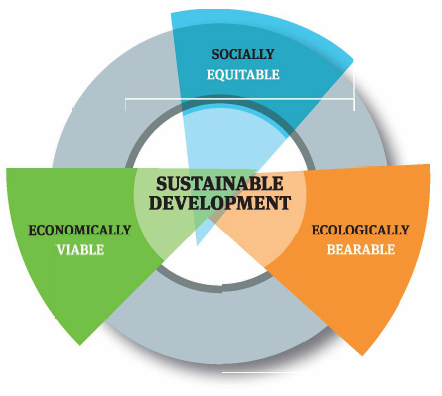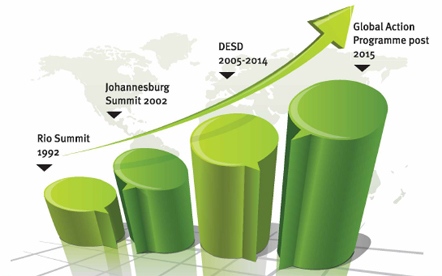Education for sustainable development in Goa
INTRODUCTION
Sustainable development has been defined as "development that meets the needs of the present without compromising the ability of future generations to meet their own needs". One of the enablers for sustainable development is 'education' as it empowers people to make sustainable choices for a better tomorrow. Of the 17 Sustainable Development Goals (SDGs) adopted by the global community, quality education is ranked fourth - and is considered instrumental for achieving the success of all other 17 SDGs.
THE IMPORTANCE OF EDUCATION IN ACHIEVING SUSTAINABLE DEVELOPMENT
Amidst all the environmental mayhem and its far reaching impacts, societies everywhere are struggling to deal with the resultant ecological and socio-economic changes that are occurring at the local, regional and global levels. Policy changes and technological innovations cannot provide us with all the solutions. A fundamental change needed is in the way we think and act. There is a need to rethink of how we relate to one another and how we interact with the ecosystems that support our lives. This is where education fits in as it equips and empowers people with the right knowledge, skills and values in order to create a sustainable, just and peaceful world. Education for Sustainable Development (ESD) is indeed all about shaping a better tomorrow for all.

THE EVOLUTION OF ESD (EDUCATION FOR SUSTAINABLE DEVELOPMENT)
It all began with the Earth Summit in 1992, where Agenda 21 emphasized the role of education in sustainable development. The Johannesburg Summit in 2002 further re-affirmed this. However, the big boost came in December 2002, when the UN declared 2005 to 2014 to be the United Nations Decade of Education for Sustainable Development (DESD). The decade aimed to promote education as a basis for a more sustainable society by integrating sustainability into the education process at all levels, and also, into all areas of life including local communities and human society in general. While the decade was successful in many ways, much work remains to be done. The Global Action Programme (GAP) is now in place "to generate and scale up action in all levels and areas of education and learning in order to accelerate progress towards sustainable development" post 2015.

TERI'S ESD INITIATIVES IN GOA
- The GREEN Olympiad: is a programme open to all schools across the state of Goa that tests the environment quotient of school students.
- Awareness campaign on waste segregation: A source segregation campaign in association with Margao Municipal Council and Goa Pollution Control Board was undertaken in 2008.
- Climate Change Awareness in Schools: An awareness campaign on climate change was implemented across 30 schools in Goa in association with the Dempo Group of Companies from 2010-2012.
- Activity Based Environment Education: A training programme for teachers to impart activity-based environment education was conducted for approximately 20 schools across the state of Goa in association with the DLShah Trust, Mumbai.
- Sustainability Tracking, Action and reporting in Schools (Project STARs): In association with the Dempo Group of Companies, STARs seeks to inspire and encourage schools to practice the principles of sustainability by focusing on its environmental and socio-cultural performance.
- Project SEARCH (Sensitization, Education and Awareness on Recycling for a Cleaner Habitat): A programme that encourages students to recycle dry (inorganic waste) in schools and homes was carried out in around 20 schools across the state of Goa from 2013-2016.
Highlights
- There is a fundamental change needed in the way we think and act - a rethink of how we relate to one another and how we interact with the ecosystems that support our lives.
- Education for Sustainable Development (ESD) has now been recognized as an integral element of quality education and a key enabler for sustainable development.
- The Global Action Programme (GAP) on ESD seeks to generate and scale-up ESD action. It is intended to make a substantial contribution to the post-2015 agenda.
- Of the 17 SDGs, quality education is ranked fourth - and is considered instrumental for achieving the success of all other 17 SDGs.
References:
- Gupta A. A Study of Existing Perceptions/Understanding of Education for Sustainable Development of Indian Teachers.
- UN Decade of Education for Sustainable Development.
- United Nation's World Commission on Environment and Development: Our Common Future.
- UNESCO Roadmap for Implementing the Global Action Programme on Education for Sustainable Development.
